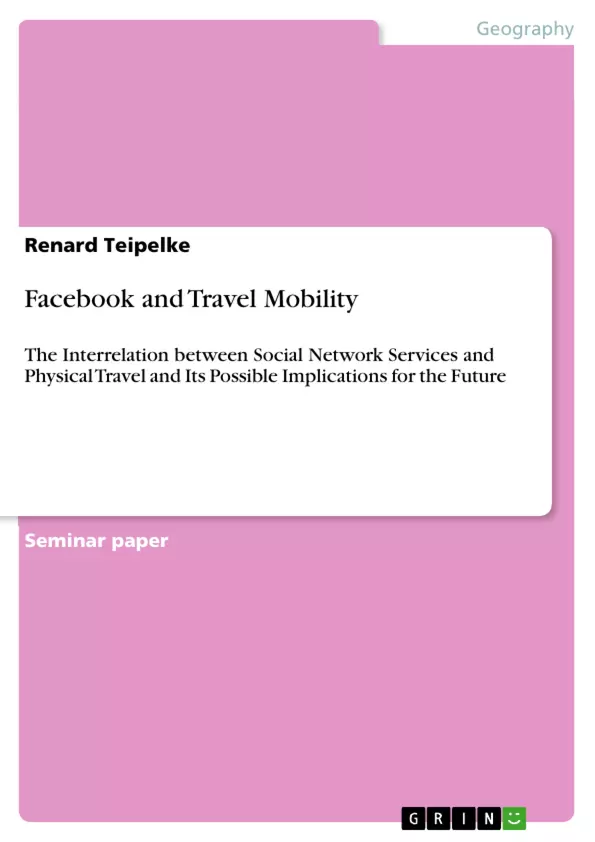In an era of information and communication technologies, imaginative and virtual travel have not substituted physical travel but resulted in a network society of multiple mobilities. People are increasingly mobile for maintaining their professional and private social relationships in intermittent face-to-face meetings. So far, we do not know much about the interrelation between travel mobility and social network services (SNSs). With the example of Facebook as the dominating, undisputed SNS of 845 million monthly active users, I will argue how ‘place’-focused features are put under the spotlight of Facebook users’ activities and perceived character. As a platform combining various services, tools, and applications also of third parties, Facebook can influence its users’ mobility habits and expectations of physical traveling. This brings with it important implications for research and practice, since foremostly young generations are concerned and will thus influence future developments.
Inhaltsverzeichnis (Table of Contents)
- Introductory Remarks
- Mobility and Social Network Services in Research
- Facebook and Place
- Facebook as a Research Object
- The Role of Place on Facebook
- Synthesis of Travel Mobility and Facebook
- Traveling in the 21st Century
- Explanations for Traveling
- How Facebook Makes a Difference
- For Whom Facebook Makes a Difference
- Implications for Research and Practice
- Concluding Remarks
Zielsetzung und Themenschwerpunkte (Objectives and Key Themes)
This paper explores the relationship between Facebook and travel mobility, examining how the platform’s features influence travel habits, particularly among young users. It aims to contribute to the understanding of the “mobility turn” and its implications for research and practice.
- The role of place in Facebook user profiles and activities.
- The influence of Facebook on travel decision-making and expectations.
- The changing nature of travel mobility in the age of social networking.
- The implications for research and practice in the fields of transportation, tourism, and social networking.
- The impact of Facebook on travel patterns among young adults.
Zusammenfassung der Kapitel (Chapter Summaries)
The paper starts by introducing the concept of travel mobility and its increasing significance in a globalized world. The author then explores the role of social networking services (SNSs) in travel mobility, focusing on Facebook as the dominant platform.
Chapter 3 examines the features of Facebook that emphasize place, such as user profiles, status updates, photo albums, and integrated applications. It argues that these features can influence travel habits by increasing awareness of destinations and generating curiosity.
Chapter 4 delves into the relationship between travel mobility and Facebook, exploring the factors driving travel decisions and how Facebook contributes to this process. The author discusses the importance of social networks in travel planning, communication, and experience sharing, highlighting the role of Facebook in fostering “interactive travel.”
Chapter 5 examines the implications of the Facebook-mobility nexus for research and practice. It suggests a need for further research exploring how Facebook activities translate into real-world travel behaviors and how the platform’s impact on travel habits influences transportation infrastructure and policy.
Schlüsselwörter (Keywords)
This paper delves into the realm of travel mobility, social network services (SNSs), particularly Facebook, and its influence on travel habits, especially amongst young users. It discusses key themes such as ‘place’ features on Facebook, “interactive travel,” travel decision-making, the “mobility turn,” and the potential impact on transportation infrastructure.
Frequently Asked Questions
How does Facebook influence travel mobility?
Facebook influences mobility habits by highlighting "place"-focused features like check-ins and photo albums, which increase awareness of destinations and shape expectations of physical traveling.
What is the "mobility turn" mentioned in the research?
The "mobility turn" refers to a shift in social sciences that views travel and movement not just as a means to an end, but as a central part of modern social life and networking.
Does virtual travel on Facebook replace physical travel?
No, imaginative and virtual travel have not substituted physical travel; instead, they have resulted in a network society where physical meetings remain essential for maintaining social relationships.
What is "interactive travel" in the context of Facebook?
Interactive travel refers to the process where travelers share their experiences in real-time on social media, allowing their network to participate virtually and influencing future travel decisions within that network.
Why are young generations the focus of this study?
Young generations are the primary users of Social Network Services (SNSs) and their digital habits will most significantly influence future developments in transportation and tourism infrastructure.
How do Facebook's "place" features generate curiosity?
By combining status updates with location data and visual content, Facebook creates a constant stream of destination-related information that can trigger a desire for physical travel among its 845 million monthly users.
- Quote paper
- M.A. Renard Teipelke (Author), 2012, Facebook and Travel Mobility, Munich, GRIN Verlag, https://www.grin.com/document/264477



